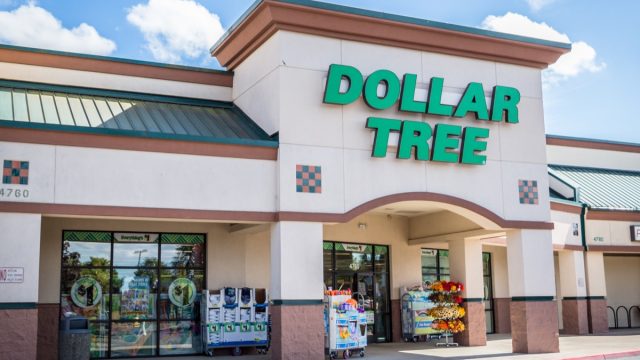Communities Are Still Fighting Back Against Dollar Stores: "An Invasive Species"
These widespread discount retailers are receiving more pushback than ever before.

At this point, you can hardly travel five miles without coming across a Dollar General, Dollar Tree, or Family Dollar. Even as high inflation has come down, many shoppers have come to embrace the reliable discounts of these omnipresent chains. But not everyone feels like lower costs are reason enough to support dollar stores, and many communities are actively fighting against the expansion of these retailers. Read on to find out why some are calling dollar stores "an invasive species."
READ THIS NEXT: 5 Warnings to Shoppers From Ex-Dollar General Employees.
Dollar General and Dollar Tree opened the most new stores last year.

While many retailers have pared down their brick-and-mortar locations, dollar store chains have been expanding across the country. Dollar General Corp. and Dollar Tree Inc., which also owns Family Dollar, beat out all other companies last year in terms of retail growth, The Wall Street Journal reported.
Combined, the two companies opened more than 1,300 new stores in 2022. As a result, Dollar General now has roughly 18,800 stores across the U.S., when it had just 5,000 in the early 2000s. Dollar Tree now has over 16,000 locations throughout the country.
But communities have been pushing back against this growth.

The response to the spread of dollar stores hasn't been uniformly positive. On Feb. 28, the nonprofit organization Institute for Local Self-Reliance (ILSR) released a report highlighting some of the pushback against these retailers.
Since 2019, at least 75 communities have voted down proposals for new dollar stores, with more than 50 of those rejected proposals occurring between Jan. 2021 and Dec. 2022, according to the report.
The ILSR also found that at least 54 cities and towns have even enacted laws that "sharply restrict new dollar stores," including regulations prohibiting them from opening a new location within one to two miles of an existing dollar store.
"With dollar stores continuing to multiply at breakneck pace … a growing number of citizen groups and local officials are rising to turn them away," the report's researchers wrote.
RELATED: For more up-to-date information, sign up for our daily newsletter.
Dollar stores are being called an "invasive species."

Communities continue to fight back against these discount retailers. In Toledo, Ohio, a group of local ministers is currently pushing the city to ban dollar stores altogether, Capital B News reported on May 17. The group claims that these chains prevent economic growth and job creation, as well as worsen food insecurity for already vulnerable areas—particularly Black, rural, and low-income communities.
"They're like an invasive species. They overpower all the resources and make the businesses in those neighborhoods vulnerable. That's where dollar stores can thrive," Rev. Donald Perryman, who is leading the fight in Toledo, told Capital B. "No matter what community, the cause of food deserts stem from one route, and that's economic disinvestment in vulnerable communities."
Those who oppose the growth of stores like Dollar General and Dollar Tree say that these stores have limited healthy food offerings. Beyond that, the apparent product discounts aren't that much better than at other retailers, when quantity and size are factored in.
"There are some people in the communities that feel like, 'What do you got against dollar stores?' … They provide quality things for poor people," Maryland State Senator Mary Washington, who represents the city and county of Baltimore, told Capital B. "When you explain … they sell canned goods that are very close to the expiration day, or they're expanding their grocery section so now we can't get a full service grocery store into the community … they get it."
Dollar General and Dollar Tree have pushed back against this criticism.

In March, Dollar General pushed back against these criticisms, telling Best Life that it works hard to invest in and serve communities—with approximately 75 percent of its stores being located in communities with 20,000 or fewer residents where "other retailers have chosen not to serve."
"We are disappointed anytime we are unable to serve our customers due to a moratorium," Dollar General said in its earlier statement. "We believe that our mission of Serving Others and our intense customer focus differentiate Dollar General from other seemingly similar retailers, something we demonstrate in communities where we are provided the opportunity to engage with government and community leaders. We do not believe moratoria are the solution to community concerns such as the availability of healthy eating options and competition; to the contrary, we believe the passage of moratoria harm customers who depend on us to help them stretch their budgets, particularly in inflationary times."
For its part, a spokesperson for Dollar Tree told Civil Eats in 2022 said that the company was aware of the pushback from some communities.
"We understand the concerns of many local officials regarding the changing nature of our shared communities across the country, and—as part of those communities—we are looking for ways to help our neighborhoods be healthier, safer, and more prosperous," the spokesperson said in a statement.
Best Life reached out to Dollar General and Dollar Tree about the fight in Toledo, and we will update this story with their response.





















